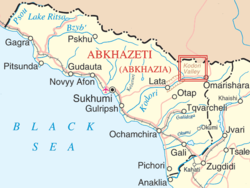
2007 Georgia helicopter attack incident
Encyclopedia

Georgia (country)
Georgia is a sovereign state in the Caucasus region of Eurasia. Located at the crossroads of Western Asia and Eastern Europe, it is bounded to the west by the Black Sea, to the north by Russia, to the southwest by Turkey, to the south by Armenia, and to the southeast by Azerbaijan. The capital of...
that three Russia
Russia
Russia or , officially known as both Russia and the Russian Federation , is a country in northern Eurasia. It is a federal semi-presidential republic, comprising 83 federal subjects...
n helicopters fired on March 11, 2007 on the Kodori Gorge, located in the only part of Abkhazia
Abkhazia
Abkhazia is a disputed political entity on the eastern coast of the Black Sea and the south-western flank of the Caucasus.Abkhazia considers itself an independent state, called the Republic of Abkhazia or Apsny...
, a break-away autonomous republic in north-western Georgia, that at the time was still under Georgia's control. The attack would have been pointed at the village of Chkhalta
Chkhalta
Chkhalta is the largest village in the upper part of the Kodori Valley, situated in Gulripsh District, Abkhazia, a breakaway Republic from Georgia.-History:...
and damaged a school and the government headquarters of the Georgian-backed Abkhaz government-in-exile. Russia denied any attacks and said all its aircraft near the area were grounded over the weekend.
Georgia
Georgian President Mikheil SaakashviliMikheil Saakashvili
Mikheil Saakashvili is a Georgian politician, the third and current President of Georgia and leader of the United National Movement Party.Involved in the national politics since 1995, Saakashvili became president on 25 January 2004 after President Eduard Shevardnadze resigned in a November 2003...
held an emergency meeting after the alleged occurrence/incident and told the Security Council that the incident created a grave situation and constituted "a very dangerous, serious and far-reaching provocation" but he stopped short of pointing the finger at Russia directly. He said that he didn't "want to make accusations against one particular side. The [Georgian] foreign minister has received instructions to contact his Russian counterpart and firmly demand that Russia react to this situation."
On March 14, Nikoloz Rurua, the then deputy chairman of the Georgian parliament's Committee for Defense and Security, did point the finger at Russia as he said that the helicopters came from Russian territory. He further said that the "helicopters, preliminarily identified as Mi-24 attack gunships, flew [into the Kodori Gorge] from Russian territory or, to be precise, from the territory of Kabardino-Balkaria
Kabardino-Balkaria
The Kabardino-Balkar Republic , or Kabardino-Balkaria , is a federal subject of Russia located in the North Caucasus. Population: -Geography:The republic is situated in the North Caucasus mountains, with plains in the northern part....
. They made a circle above the villages of Upper Abkhazia, and as they were making a second circle they dropped about 20 unguided rockets, or so-called NURS [Russian-made unguided] rockets." Georgian Deputy Foreign Minister Eka Sguladze made similar allegations in remarks to foreign diplomats that day.
Russia
The deputy commander of Russia's ground forces, Lieutenant General Valery Yevnevich responded that helicopters could not have flown over the Caucasus mountain range. "From the Russian side, it is impossible for helicopters to find a passage to fly through because of the high mountains. Mount ElbrusMount Elbrus
Mount Elbrus is an inactive volcano located in the western Caucasus mountain range, in Kabardino-Balkaria and Karachay-Cherkessia, Russia, near the border of Georgia. Mt. Elbrus's peak is the highest in the Caucasus, in Russia...
is over 5,000 meters high. Helicopters cannot fly over the Caucasus mountain range for technical reasons," Yevnevich said. Russian Foreign Ministry spokesman Mikhail Kamynin added that Russia was investigating the circumstances of the shooting, but noted that the air force said it did not conduct flights in the area at the time.
United Nations
A quadripartite Joint Fact-Finding Group (JFFG) was convened to investigate the incident. The JFFG, headed by the UN Observer Mission in Georgia, also involved representatives of Russian peacekeepers, and both the Georgian and Abkhaz sides. The interim report was released on April 2, 2007, followed by a supplementary report on June 13. The report was inconclusive, but it confirmed that "helicopters used multiple approaches from the north" to reach the upper Kodori Gorge. It also ruled out the possibility of Georgia's involvement in the incident.Aftermath
Georgia accused Russia of a similar incident in August 2007 when a missile was allegedly fired upon Georgian soil2007 Georgia missile incident
The 2007 Georgia missile incident refers to the landing of a missile in the Georgian village of Tsitelubani in the Gori district near the Georgian-Ossetian conflict zone, some north-west of Tbilisi, the capital of Georgia, on August 7, 2007...
, which was denied by Russia. Georgia pressed the UN Security Council to look into both the helicopter and the missile incident.

